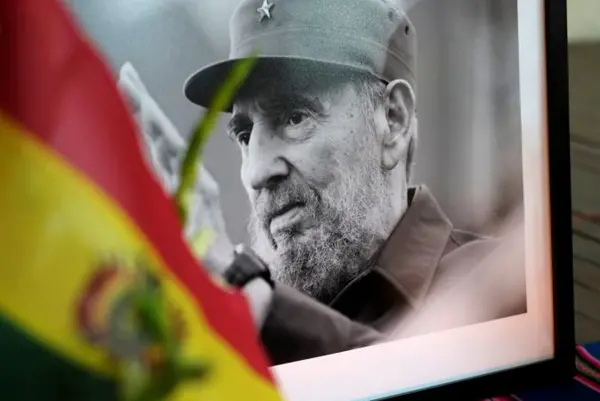Cuba's most prominent dissident group called off its weekly protest march for the first time in 13 years on Sunday following the death of its nemesis Fidel Castro, the revolutionary leader whose passing has cast a pall over the island.
Castro, an icon of the Cold War who built a communist state on the doorstep of the United States and defied half a century of U.S. efforts to topple him, died late on Friday at the age of 90.
The Cuban government has declared a nine-day period of mourning and suspended alcohol sales and even baseball games.
The Ladies in White dissident group decided to avoid creating tensions this week.
"We're not going to march today so that the government does not take it as a provocation and so that they can pay their tributes," the group's leader, Berta Soler, said on Sunday. "We respect the mourning of others and will not celebrate the death of any human being."
Pictures of Cuba's former president Fidel Castro (L) and Venezuela's late president Hugo Chavez are seen on a wall near a Cuban flag inside a state office in Havana, Cuba November 26, 2016.REUTERS/Enrique de la Osa
The group, originally formed in support of husbands jailed for political opposition, has called protest marches in Havana following Mass at a Roman Catholic Church each Sunday for the past 13 years. The group is funded by Cuban exiles in the United States, and the government says its members are mercenaries doing the bidding of the U.S. government.
Still, their movement has been the rare expression of dissent to be largely tolerated by the Communist government, although police have clamped down over the past several months, stopping protesters in their homes and preventing the demonstrations from taking place.
The difference this week is that dissidents themselves have opted against even trying, three opposition leaders said.
The cause of Castro's death was not made public but he had been in poor health since he nearly died of an intestinal illness in 2006. He formally ceded power to his younger brother, Raul, in 2008 after ruling for nearly half a century.
A Cuban flag flies at half mast near the Malecon, following the announcement of the death of Cuban revolutionary leader Fidel Castro, in Havana, Cuba November 27, 2016.REUTERS/Carlos Barria
Admirers of Fidel Castro and his legacy point to social achievements since his 1959 revolution such as free healthcare and education, but critics have long condemned a lack of political freedom on the island.
"You can´t talk about politics here. There are no public protests because measures are taken, people don´t want to fall prisoner," said Roberto, 53, as he shopped in downtown Havana. He declined to give his surname for fear of reprisals.
"You can't talk much," he added.
The streets of Havana have been calm since Castro's death, with people expressing national pride by hanging more Cuban flags than normal.
Lysset Perez, a 44-year-old peanut vendor, dressed in the national colors with a single-starred, blue, red and white flag on her head on Sunday.
"It's calm but a little dark because Cuba is music and for nine days of mourning there will be no music," Perez said. "There is calm and sadness. If it weren't for Fidel and the revolution, the people wouldn't be as they are: educated and cultured."
State television broadcast non-stop tributes to Castro's accomplishments, as well as excerpts of his speeches, and announced plans to fire gun salutes in his honor.
Castro was cremated on Saturday and the ashes will be carried in a caravan next week to a final resting place in Santiago de Cuba, the city in eastern Cuba where he first launched his revolution in the 1950s. His funeral will take place on Dec. 4.
(REUTERS)
 简体中文
简体中文

